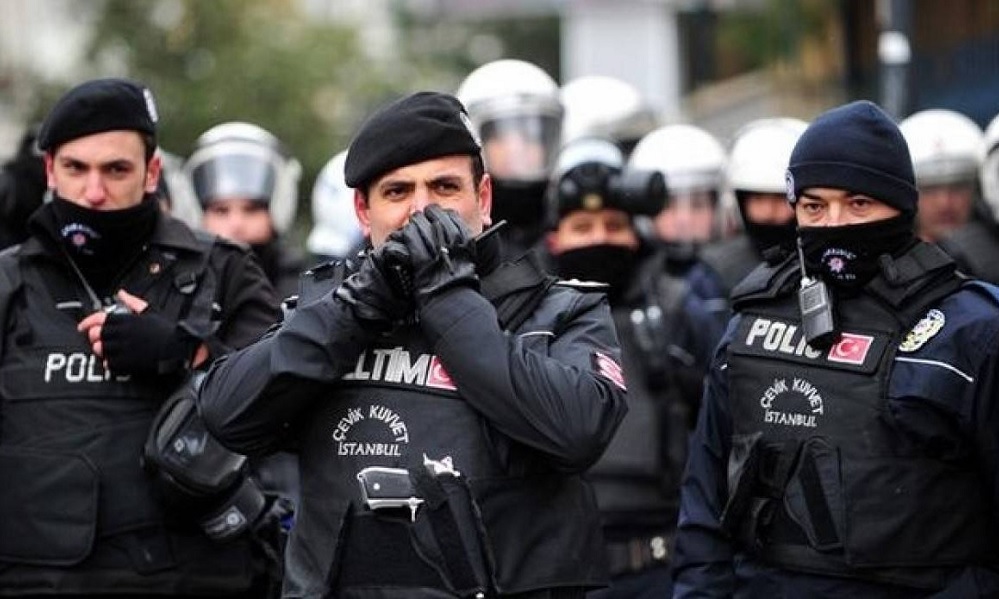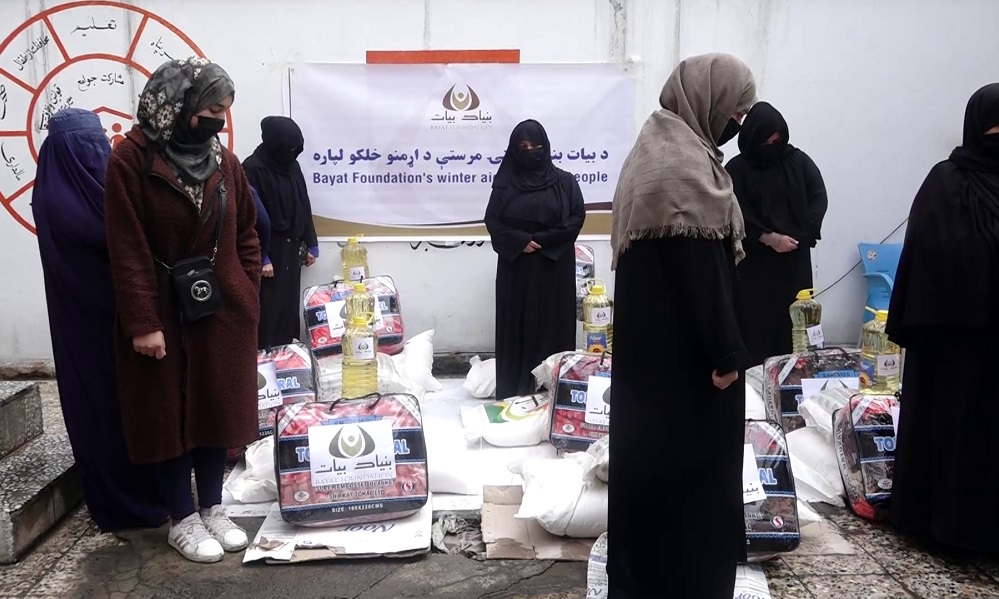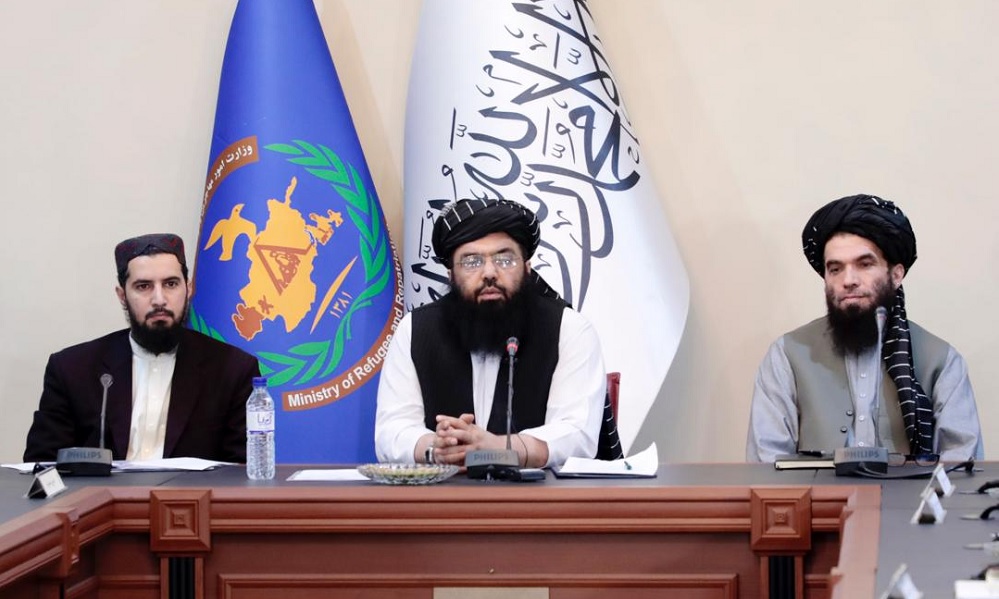Latest News
US ‘deeply troubled’ by attacks on civilians as Taliban sweep across Afghanistan

The United States said on Wednesday it was deeply troubled by reports of escalating attacks on civilians as the Taliban sweep across Afghanistan and Washington pulls out its last remaining troops and ends its longest war.
Secretary of State Antony Blinken, on a visit to India, said the only path to peace in Afghanistan was through negotiations, which all parties must take seriously.
Taliban insurgents have captured districts across Afghanistan and seized vital border control points in recent weeks, as Washington withdraws its last troops after 20 years. The Pentagon now estimates that the fighters control more than half of Afghanistan‘s district centres.
The surge has raised the prospect that the militants could return to power. Millions of people fled their extreme violence during their last period of rule from 1996-2001, when they staged public executions of their foes, banned women from work and education and hosted Osama bin Laden’s al Qaeda network.
The Taliban say they will treat civilians well if they return to power, and will not allow the country to be used as a base for international terrorism.
Describing reports of attacks on civilians as “deeply, deeply troubling”, Blinken said: “An Afghanistan that commits atrocities against its own people would become a pariah state.
“There’s only one path, and that’s at the negotiating table, to resolve the conflict peacefully.”
The United Nations reported this week that civilian casualties had been surging in recent weeks, with as many killed in May-June as in the previous four months. The report did not cover casualties in July, when fighting has intensified further.
Afghans in government-held areas have been alarmed by domestic media reports in recent days of abductions and killings of civilians in areas where the Taliban have advanced. The Taliban deny they are carrying out revenge killings.
U.S. President Joe Biden has ordered all U.S. troops out of the country, fulfilling a policy pledge made by his predecessor Donald Trump, despite warnings from American generals of the potential for renewed civil war without foreign troops to protect the Kabul government.
Peace talks between the government and the Taliban in Qatar have largely stalled, with the Taliban showing little interest in negotiating while they are gaining on the battlefield.
CHINA HOSTS TALIBAN DELEGATION
Taliban delegations have visited neighbouring countries in recent weeks, gaining international standing for a movement that had been treated as outcasts and banned as terrorists for most of the past two decades.
The latest regional power to host them was China, whose Foreign Minister Wang Yi met a nine-person delegation led by Taliban deputy leader Mullah Baradar Akhund in the northern Chinese city of Tianjin during a two-day visit.
Wang said the Taliban were expected to “play an important role in the process of peaceful reconciliation and reconstruction in Afghanistan“, according to a readout of the meeting from the Chinese Foreign Ministry.
Taliban delegations have also visited Iran and Russia in recent weeks. The group has an office in Qatar.
“Politics, economy and issues related to the security of both countries and the current situation of Afghanistan and the peace process were discussed in the meetings,” Taliban spokesperson Mohammed Naeem tweeted about the China visit.
“(The) delegation assured China that they will not allow anyone to use Afghan soil against China,” Naeem said. “China also reiterated its commitment of continuation of their assistance with Afghans and said they will not interfere in Afghanistan‘s issues but will help to solve the problems and restoration of peace in the country.”
Moscow, which fought for a decade in Afghanistan in the 1980s, said it was beefing up the combat capabilities at its military base in Tajikistan, a small former Soviet republic that borders Afghanistan.
Russian Defence Minister Sergei Shoigu, visiting Tajikistan on Wednesday, said the security situation had rapidly deteriorated in Afghanistan during a “hasty” U.S. withdrawal.
Shoigu said Islamic State fighters were moving into Afghanistan from countries including Syria and Libya, describing their arrival as “quite seriously organised”.
“We are paying increased attention to strengthening the combat capabilities of our base and refining plans to jointly repel possible insurgent infiltration,” he said.
A senior Russian diplomat has said Moscow views Taliban gains in northern Afghanistan as having a security upside because the group is hostile to what Russia regards as more dangerous Islamist extremists.
Russia is set to hold military drills on Aug. 5-10 near Tajikistan’s Afghan border, involving more than 1,000 Russian soldiers as well as Uzbek and Tajik forces.
Latest News
Turkish intelligence captures a Daesh member near the Durand Line

Turkish intelligence agents have captured a senior member of Daesh near the Durand Line, reportedly preventing planned suicide attacks in Turkey and other countries, according to Turkey’s state-run Anadolu Agency on Monday.
The suspect, identified as Mehmet Goren, is a Turkish citizen. He was apprehended during a covert operation and transferred to Turkey. Details on the timing of the operation or the involvement of Afghan and Pakistani authorities were not disclosed.
According to the report, Goren had risen through the ranks of Daesh and was allegedly tasked with carrying out suicide bombings in Turkey, Pakistan, Afghanistan, and Europe.
Daesh has a history of deadly attacks in Turkey, including the January 1, 2017 shooting at an Istanbul nightclub that killed 39 people.
Anadolu Agency reported that Goren’s arrest also provided intelligence on the group’s recruitment strategies and planned activities.
Latest News
Dozens of needy families in Kabul receive winter aid from Bayat Foundation

Dozens of needy families in Kabul’s fifth district have received essential winter assistance from the Bayat Foundation, as part of ongoing efforts to ease hardship during the cold season and worsening economic conditions.
According to foundation officials, the aid package includes staple food items such as flour, rice, and cooking oil, along with warm blankets to help families cope with freezing temperatures. Haji Mohammad Ismail, Deputy Head of Bayat Foundation, said the distribution began in Kabul and will soon be expanded to other provinces.
“Our assistance includes flour, rice, cooking oil, and blankets,” Ismail said. “Today, we started distributing these items in Kabul’s fifth district, and God willing, the aid will reach other provinces in the near future.”
Afghanistan continues to face widespread poverty, unemployment, and food insecurity, with many families struggling to meet basic needs, particularly during winter when access to work and heating becomes more difficult.Humanitarian organizations and charitable foundations have stepped up relief efforts to support those most affected.
Beneficiaries welcomed the assistance, describing it as a lifeline. “May God bless you for helping the poor. We had nothing and no work,” said one recipient. Another added, “Thank you for your help. Our flour was almost finished.”
Bayat Foundation officials stressed that winter aid distributions will continue in Kabul and other provinces in the coming days, as part of their broader commitment to supporting needy families across the country.
Latest News
Nearly seven million Afghan refugees return home since Islamic Emirate’s takeover

Since the Islamic Emirate came to power, approximately 6.8 million Afghans have returned home, either voluntarily or forcibly, from neighboring countries and other nations, according to the Minister of Refugees and Repatriation.
Mawlawi Abdul Kabir, speaking at a meeting on finalizing a draft plan for a permanent migration solution in Afghanistan, added that 1.3 million Afghans have been internally displaced due to natural disasters during the same period.
With winter approaching, widespread poverty and severe cold are threatening thousands of lives. Meanwhile, the forced expulsion of Afghan migrants from neighboring countries, particularly Iran and Pakistan, continues.
The Islamic Emirate has repeatedly urged neighboring states to allow migrants to return voluntarily. According to UNHCR, over two million Afghans have returned from Iran and Pakistan since the start of 2025.
-

 Latest News3 days ago
Latest News3 days agoAfghan border forces prevent illegal entry of hundreds into Iran
-

 Latest News3 days ago
Latest News3 days agoPakistan summons Afghan diplomat over deadly attack in North Waziristan
-

 Latest News2 days ago
Latest News2 days agoAfghan health minister calls for medical cooperation between Kabul and New Delhi
-

 Latest News1 day ago
Latest News1 day agoAfghanistan signs 30-year deal for marble mining in Daikundi
-

 Latest News3 days ago
Latest News3 days agoJapan allocates nearly $20 million in humanitarian aid for Afghanistan
-

 Latest News2 days ago
Latest News2 days agoKarzai urges reopening of girls’ schools and universities for Afghanistan’s bright future
-

 Health5 days ago
Health5 days agoAfghanistan seeks India’s support in standardizing traditional medicine
-

 World5 days ago
World5 days agoUS readies new Russia sanctions if Putin rejects peace deal, Bloomberg News reports
























